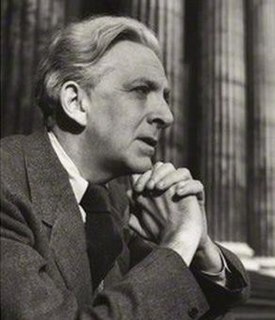A Quote by Jean-Baptiste Say
What is the motive which operates in every man's breast to counteract the impulse towards the gratification of his wants and appetites?
Related Quotes
Love is the impulse which directs the world, And all things know it and obey its power. Man, in the maelstrom of his passions whirled; The bee that takes the pollen to the flower; The earth, uplifting her bare, pulsing breast To fervent kisses of the amorous sun;-- Each but obeys creative Love's behest, Which everywhere instinctively is done.
Conscience is a judge in every man's breast, which none can cheat or corrupt, and perhaps the only incorrupt thing about him; yet, inflexible and honest as this judge is (however polluted the bench on which he sits), no man can, in my opinion, enjoy any applause which is not there adjudged to be his due.
A living creature develops a destructive impulse when it wants to destroy a source of danger... The original motive is not pleasure in destruction... I destroy in a dangerous situation because I want to live and do not want to have any anxiety. In short, the impulse to destroy serves a primary biological will to live.
Whatever the situation may be, in the recollection of death there is reward and merit. For even the man engrossed in the world benefits from it by acquiring an aversion to this world, since it spoils his contentment and the fullness of his pleasure; and everything which spoils for man his pleasures and his appetites is one of the means of deliverance.
Of all the animals with which this globe is peopled, there is none towards whom nature seems, at first sight, to have exercised more cruelty than towards man, in the numberless wants and necessities with which she has loaded him, and in the slender means which she affords to the relieving these necessities.
We know – it has been measured in many experiments – that children with strong impulse control grow to be better adjusted, more dependable, achieve higher grades in school and college and have more success in their careers than others. Success depends on the ability to delay gratification, which is precisely what a consumerist culture undermines. At every stage, the emphasis is on the instant gratification of instinct. In the words of the pop group Queen, “I want it all and I want it now.” A whole culture is being infantilised.
So near are the boundaries of panegyric and invective, that a worn-out sinner is sometimes found to make the best declaimer against sin. The same high-seasoned descriptions which in his unregenerate state served to inflame his appetites, in his new province of a moralist will serve him (a little turned) to expose the enormity of those appetites in other men.
All the seven deadly sins are self destroying, morbid appetites, but in their early stages at least, lust and gluttony, averice and sloth know some gratification, while anger and pride have power, even though that power eventually destroys itself. Envy is impotent, numbed with fear, never ceasing in its appetite, and it knows no gratification, but endless self torment. It has the ugliness of a trapped rat, which gnaws its own foot in an effort to escape.
God never estimates what we give from impulse. We are given credit for what we determine in our hearts to give; for the giving that is governed by a fixed determination. The Spirit of God revolutionises our philanthropic instincts. Much of our philanthropy is simply the impulse to save ourselves an uncomfortable feeling. The Spirit of God alters all that. As saints our attitude towards giving is that we give for Jesus Christ's sake, and from no other motive.





































